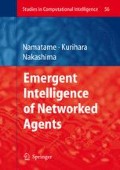Access this chapter
Tax calculation will be finalised at checkout
Purchases are for personal use only
Preview
Unable to display preview. Download preview PDF.
References
Bettman, J. (1979). An information processing theory of consumer choice. Addison Wesley, Reading, MA (USA).
Bettman, J., Luce, M., and Payne, J. (1988). Constructive consumer choice processes. Journal of Consumer Research, pages 187-217.
Brian, A. W. (1994). Inductive reasoning and bounded rationality. American Economic Review, pages 406-411.
Currim, I. (1988). Disaggregate tree-structured modeling of consumer choice data. Journal of Marketing Research, pages 253-265.
Degeratu, A. M., Arvind, R., and Wu, J. (2000). Consumer choice behavior in online and traditional supermarkets: The effects of brand name, price, and other search attributes. International Journal of Research in Marketing, pages 55-78.
Guadagni, P. and Little, J. (1983). A logit model of brand choice calibrated on scanner data. Marketing science, pages 203-238.
Hales, D. (1998). An open mind is not an empty mind – experiments in the meta-noosphere. The Journal of Artificial Societies and Social Simulation (JASSS).
Hoyer, W. (1988). An examination of consumer decision making for a common repeat purchase product. Journal of Consumer Research, pages 822-829.
J. G. Lynch, J. and Ariely, D. (2000). Wine online: search costs and competiotion on price, quality and distribution. Marketing Science, pages 1-39.
Kephart, J. O., Hanson, J. E., Levine, D. W., Grosof, B. N., Sairamesh, J., Segal, R., and White, S. R. (1998). Dynamics of an information-filtering economy. In Cooperative Information Agents, pages 160-171.
Lomuscio, A., Wooldridge, M., and Jennings, N. R. (2001). A classification scheme for negotiation in electronic commerce. In AgentLink, pages 19-33.
Maes, P. (1994). Agents that reduce work and information overload. Communications of the ACM, pages 31-40.
Neri, F. (2001). An agent based approach to virtual market place simulation. In Congresso dell’Associazione Italiana Intelligenza Artificiale 2001 (AIIA01), pages 43-51.
Neri, F. and Saitta, L. (1996). Exploring the power of genetic search in learning symbolic classifiers. IEEE Trans. on Pattern Analysis and Machine Intelligence, PAMI-18:1135-1142.
Rocha, A. P. and Oliveira, E. (1999). Agents advanced features for negotiation in electronic commerce and virtual organisations formation process. Agent Mediated Electronic Commerce - An European Perspective, LNAI 1991.
Rodriguez-Aguilar, J. A., Martin, F. J., Noriega, P., Garcia, P., and Sierra, C. (1998). Towards a test-bed for trading agents in electronic auction markets. AI Communications, 11(1):5-19.
Sierra, C., Jennings, N., Noriega, P., and Parsons, S. (1998). A framework for argumentation based negotiation. In Intelligent Agents IV, volume LNAI 1365, pages 177-192, Vienna, Austria. Springer-Verlag.
Under-Smith, M. D., Bailey, J., and Brynjolfsson, E. (2001). standing digital markets: review and assessment.Draft available at http://ecommerce.mit.edupapersude, pages 1-34.
Viamonte, M. J. and Ramos, C. (1999). A model for an electronic market place. Agent Mediated Electronic Commerce - An European Perspective, LNAI 1991:3-28.
Wright, P. (1975). Consumer choice strategies: symplifying vs optimizing. Journal of Marketing Research, pages 60-67.
Author information
Authors and Affiliations
Editor information
Editors and Affiliations
Rights and permissions
Copyright information
© 2007 Springer-Verlag Berlin Heidelberg
About this chapter
Cite this chapter
Neri, F. (2007). Using an agent based simulation to evaluate scenarios in customers' buying behaviour. In: Namatame, A., Kurihara, S., Nakashima, H. (eds) Emergent Intelligence of Networked Agents. Studies in Computational Intelligence, vol 56. Springer, Berlin, Heidelberg. https://doi.org/10.1007/978-3-540-71075-2_14
Download citation
DOI: https://doi.org/10.1007/978-3-540-71075-2_14
Publisher Name: Springer, Berlin, Heidelberg
Print ISBN: 978-3-540-71073-8
Online ISBN: 978-3-540-71075-2
eBook Packages: EngineeringEngineering (R0)

